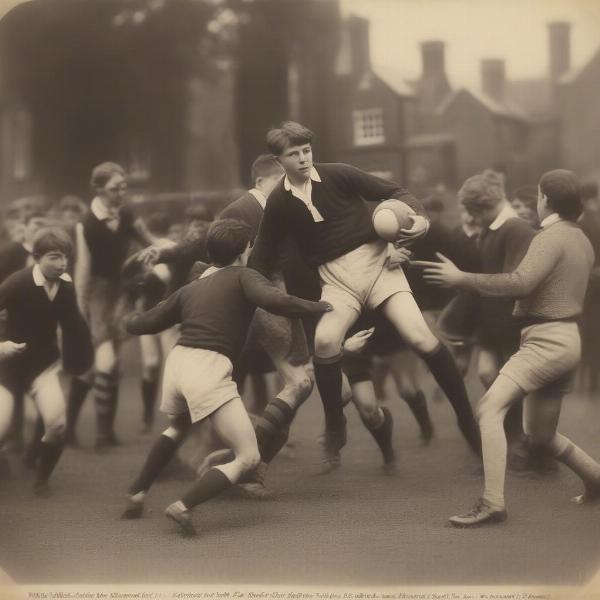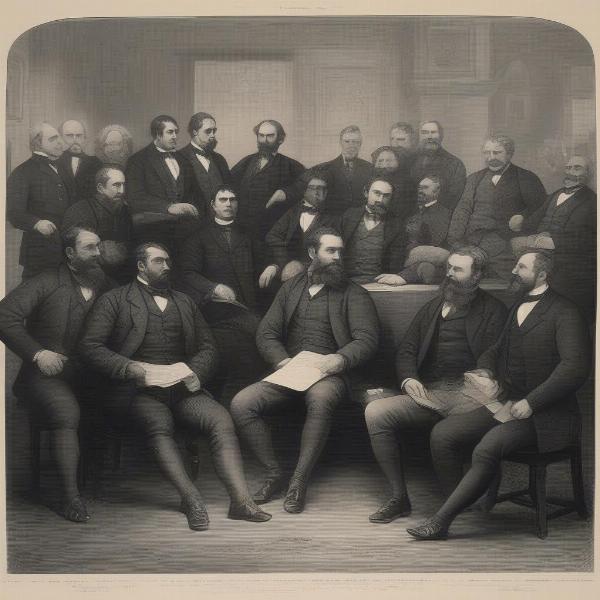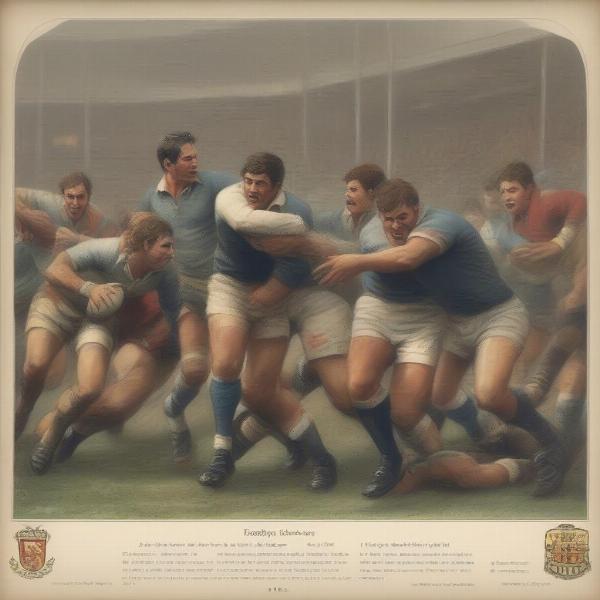The question of Who Invented The Game Rugby often leads to the legendary tale of William Webb Ellis. While the story is captivating, the reality is more nuanced. This article delves into the complex history behind rugby’s origins, exploring the individuals and events that shaped the sport we know and love today.
The Legend of William Webb Ellis
The most popular account credits William Webb Ellis with the invention of rugby. The story goes that in 1823, during a football match at Rugby School in Warwickshire, England, young William defied the rules and picked up the ball, running with it towards the opposition’s goal. This act of rebellion is said to have been the genesis of rugby football. While this makes for a compelling narrative, historical evidence supporting this claim is scarce.
Rugby School and the Development of the Game
Regardless of the William Webb Ellis legend’s accuracy, Rugby School undeniably played a significant role in the sport’s development. During the early 19th century, football games at Rugby School were known for their rough and tumble nature, with varying rules from other schools. These early forms of football allowed for handling the ball under certain circumstances. It was a gradual evolution, with rules changing and adapting over time. The school’s influence led to the formalization of rules that distinguished “Rugby Football” from other forms of football played at the time. This eventually led to the formation of the Rugby Football Union (RFU) in 1871.
 William Webb Ellis at Rugby School: Depicting the Legendary Moment
William Webb Ellis at Rugby School: Depicting the Legendary Moment
From Rugby School to the World: The Spread of the Game
As former students of Rugby School dispersed across the globe, they carried the game with them, establishing clubs and spreading the unique rules and traditions of rugby football. The British Empire played a crucial role in the global dissemination of the sport. From the colonies of Australia and New Zealand to South Africa and India, rugby gained a foothold and quickly became a popular sport. The international nature of the game is evident today, with nations worldwide competing at the highest level.
The Formation of the Rugby Football Union and the Codification of Rules
The formation of the RFU in 1871 was a landmark event in rugby history. Representatives from 21 clubs met to establish a standardized set of rules for the game. This marked the official separation of rugby from association football (soccer), clarifying the rules surrounding handling the ball and other aspects of gameplay. The RFU’s establishment provided a governing body to oversee the sport and promote its growth.
 Formation of the Rugby Football Union in 1871
Formation of the Rugby Football Union in 1871
Distinguishing Rugby from Other Forms of Football
Rugby’s distinctive characteristics set it apart from other football codes. The continuous play, emphasis on forward passing, and the scrum are just a few elements that define the sport. These elements evolved over time, influenced by the playing conditions at Rugby School and the preferences of early players. The development of these distinctive features solidified rugby’s unique identity and contributed to its growing popularity.
Early Pioneers and Innovators of Rugby
Beyond William Webb Ellis, numerous individuals contributed to the early development and popularization of rugby. Players, coaches, and administrators at Rugby School and other early clubs played a vital role in shaping the game. Their contributions, although often overlooked, were instrumental in defining the sport’s core principles and fostering its growth.
“The evolution of rugby was a collective effort, with numerous individuals contributing to its unique identity,” says Dr. Thomas Arnold, a fictional historian specializing in 19th-century sports. “Focusing solely on William Webb Ellis overlooks the wider context of the sport’s development.”
Debunking the Myths Surrounding Rugby’s Origins
While the William Webb Ellis story remains a popular part of rugby lore, historical research suggests it is more likely a myth than historical fact. The lack of contemporary evidence and the existence of other similar stories from the period cast doubt on the legend’s accuracy. Understanding the complexities of rugby’s origins requires going beyond the simple narrative and acknowledging the contributions of many individuals and institutions.
 Early Rugby Evolution and Key Players
Early Rugby Evolution and Key Players
The Enduring Legacy of Rugby: A Global Phenomenon
Today, rugby is a global sport played by millions. From the professional leagues to grassroots clubs, the game thrives on its unique blend of physicality, skill, and camaraderie. The legacy of Rugby School and the early pioneers of the game lives on, inspiring generations of players and fans worldwide.
Conclusion
While the story of William Webb Ellis captures the imagination, the question of who invented the game rugby has a more complex answer. Rugby’s evolution was a gradual process, shaped by the contributions of numerous individuals and the unique environment of Rugby School. Understanding this history allows us to appreciate the rich tapestry of the sport and its enduring legacy. What other myths about sports origins do you know? Share in the comments below!
FAQ
- Is the William Webb Ellis story true? Historical evidence supporting the story is limited, leading many to believe it is a myth.
- When was the Rugby Football Union formed? The RFU was formed in 1871.
- How did rugby spread across the world? Former students of Rugby School and the influence of the British Empire played significant roles in the sport’s global spread.
- What are some key differences between rugby and soccer? Rugby allows for forward passing and features elements like the scrum and continuous play, distinguishing it from soccer.
- Who are some other important figures in early rugby history? Many players, coaches, and administrators at Rugby School and other early clubs contributed to the development of the game, though their names are less widely known.
- Where can I learn more about the history of rugby? Numerous books and online resources offer in-depth information on the history of rugby.
- Why is understanding the origins of rugby important? It provides context for the modern game and helps us appreciate the evolution of the sport and its global impact.

